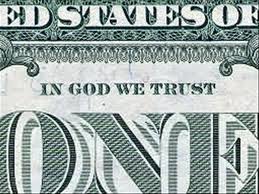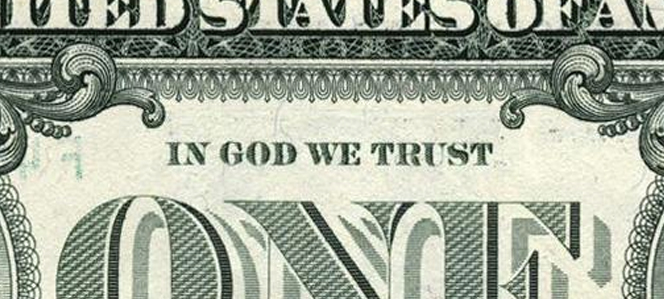Why It Matters That Our Democracy Trusts in God
By Rev. Robert Barron
 I was pleased to see that the United States Supreme Court recently dismissed a suit brought by Michael Newdow, a Sacramento man who wanted to remove the phrase “In God We Trust” from the nation’s coins and paper currency, as well as from the fronts of our public buildings. The tired argument that the gentleman brought forward was that this custom somehow violates the first amendment guarantee that the government shall make no law either establishing an official religion or prohibiting the free exercise of religion in the United States. As many have pointed out over the years, the invocation of God or the presence of religious symbols in the public space have nothing to do with what the Founders meant by the establishment of an official religion—a practice whose dangerous consequences they knew only too well from relatively recent English history. The affirmation that there should be no governmentally sanctioned religion in the United States by no means carries as an implication the elimination of religious language and values from the public square.
I was pleased to see that the United States Supreme Court recently dismissed a suit brought by Michael Newdow, a Sacramento man who wanted to remove the phrase “In God We Trust” from the nation’s coins and paper currency, as well as from the fronts of our public buildings. The tired argument that the gentleman brought forward was that this custom somehow violates the first amendment guarantee that the government shall make no law either establishing an official religion or prohibiting the free exercise of religion in the United States. As many have pointed out over the years, the invocation of God or the presence of religious symbols in the public space have nothing to do with what the Founders meant by the establishment of an official religion—a practice whose dangerous consequences they knew only too well from relatively recent English history. The affirmation that there should be no governmentally sanctioned religion in the United States by no means carries as an implication the elimination of religious language and values from the public square.
I will argue, in point of fact, that the aggressive eradication of religion from the public forum does serious damage to our democracy. In order to see the truth of this, it might be wise to journey in imagination to a stuffy boarding house in Philadelphia in the summer of 1776 where a young Virginian lawyer is laboring over the opening lines to a rather significant document. Providing the widest possible context for his argument that the American colonies ought to be free of British tyranny, Thomas Jefferson writes “we hold these truths to be self-evident: that all men are created equal and that they are endowed by their Creator with certain inalienable rights. Among these are life, liberty, and the pursuit of happiness.” Now if one puruses the history of political philosophy prior to the emergence of Christianity—consulting, say, the works of Plato, Aristotle, and Cicero—one would be hard pressed indeed to find any ringing affirmations of equality and human rights. In fact, for the classical thinkers, the deep and undeniable inequalities that obtain among us—differences in intelligence, courage, physical beauty, virtue, etc.—must be fully acknowledged if a just society is to emerge. The suggestion that the equality of all people is the foundation of the political order would have struck Plato as the height of folly and, practically speaking, a formula for chaos.
How do we possibly explain the transition from the classical idea that equality is self-evidently false to Jefferson’s notion that it is self-evidently true? The best clue is in the very language of Jefferson’s prologue, more precisely, in a word that we usually rush past without noticing: “All men are created equal.” Jefferson knew as surely as Aristotle that human beings are radically unequal in practically every category of existence, but he also knew something from his Christian heritage that Aristotle couldn’t possibly have known, namely, that all people are indeed equally the children of God. Take God and creation out of the calculus, and Jefferson’s claim becomes anything but self-evident.
Another of Jefferson’s axioms is that all people, equal before God, have been endowed by that same God (“their Creator”) with certain rights which are inalienable, that is to say, which can be neither granted nor rescinded by any human institution or contrivance. Once again, if we consult the classical political theorists, we find none of this. For Plato, Aristotle, Cicero and their colleagues, special privileges belonged to those who had earned them or had inherited them from aristocratic forebears. That every person in the political order is the subject of rights to life and liberty would have struck them as a ridiculous and counter-intuitive proposition. So we are compelled to ask what made the difference, and the answer, once again, is God. Take out of consideration the Creator, who made every person in love and destined each for eternal life, and properly inalienable rights promptly disappear. And individuals become, in very short order, the objects of political manipulation and domination. To see the truth of this, all we have to do is look at the totalitarianisms of the last century, governments that were grounded in an explicit denial of God. The negation of equality and the suppression of fundamental human rights in Hitler’s Germany, Stalin’s Russia, Mao’s China, Pol Pot’s Cambodia, and Castro’s Cuba followed directly from the systematic denial of the Creator God.
Democracies appropriately involve the debating of public policy, the electing of officials, the existence of a free press, and the rule of law, but those practices and customs are rooted in certain conditions that are not themselves the object of deliberation. They are founded in moral absolutes—among which are liberty, equality, the inviolability of life, and the right to pursue happiness; and these non-negotiable truths are in turn logically correlative belief in a Creator God. And this is why I would hold, precisely as an American, that it is supremely dangerous to our democracy to eradicate references to God from our public space. Therefore, as an adept of both Thomas Aquinas and Thomas Jefferson, I say “Bravo” to the Supreme Court for this recent decision.
